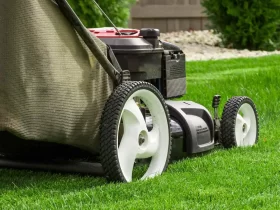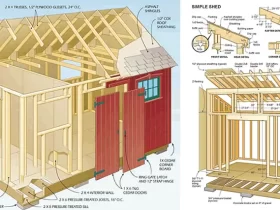Are you looking to add a quality, eco-friendly material to your driveway or home this spring? Asphalt millings are the perfect choice! This guide will provide you with everything you need to know about asphalt millings, including their many benefits and how they can help your home patio or driveway look and function its best. Let’s get started learning how to use asphalt millings for your own projects!
What is Asphalt Millings, aka Pavement Milling, Recycled Asphalt or Milled Asphalt
Asphalt millings, also known as “pavement millings” or “recycled asphalt,” are small pieces of asphalt pavement that have been brought up by milling machines or grinders. These pieces of asphalt can then be recycled and used for paving, patio and driveway projects.
When it comes to using asphalt millings for home projects, there are several things you should know before beginning your project. First and foremost, you need to understand what exactly asphalt millings are. They are a combination of small particles of stones or rocks that have been brought up and recycled during a road renewal, resurfacing or paving job. Generally, these pieces range in size from tiny grains up to 1/4-inch size bits.
When you purchase asphalt millings for use in your driveway project – whether it be as an alternative to traditional paving methods like poured concrete or concrete pavers – you will need to consider what type of binder is best for mixing with it to create a more solid surface upon which to drive your vehicles and park them. Without a proper binding agent, and correct surface preparation, it is possible for the surface to be too soft, which could permit heavy loads to dent, or sink into the surface the surface when parked in place over time. Without proper sealing, the situation can be exasperated due climate conditions such as heat and precipitation. Additionally, using the proper materials to seal your asphalt millings assists in ensuring the longevity of your surface during freeze/thaw cycles.
Using post installation treatments to such as liquid rubber waterproof sealants will increase the durability and lifetime of the surface. Additional protection can also be applied, such as using paint and dust control sealing agents to add additional structural integrity and protection to your patio or driveway, as these additional binders help to further protect the integrity of your surface for a longer period of time.
 Best Uses for Asphalt Milling?
Best Uses for Asphalt Milling?
When it comes to driveway construction, asphalt milling can provide a great solution. Not only is it much cheaper than new asphalt, or concrete solutions, but there are many asphalt milling contractors available in most markets who offer the services at a lower cost than competing options. That said, when considering the use of asphalt millings for driveways, there are several factors to consider.
For most residential areas, standard or reclaimed pen mix Asphalt Millings are best used for roads and large parking lots; whereas a finer graded product, such as Superpave mix Asphalt Millings are best used for homes and walkways as they provide an optimal wear surface as well as proper bonding with underlying subbase layers.
As part of the process of using milling asphalt on a driveway or parking lot area, various preparations and tasks may be needed prior to laying down the final surface course layer. The steps required may include:
- Scarifying loose surfaces off existing pavement layers.
- Removing any old seal coating from any existing pavement surfaces.
- Applying appropriate anti-strip (tack) coat lubricant product on the existing pavements layers.
- Installing overall tack coating binder layer products over old surfaces.
- Ensuring any patchwork of holes, low areas or other damage is completed over intended areas, to ensure asmooth transition over entire job-site area.
- If the job is being completed over raw ground, or soil, it is wise to consider using a soil stabilizing agent prior to applying the millings over the area.
Milling asphalt is a great option for driveways because it is more affordable than the more traditional paved driveways. Also, an asphalt-milling driveway can be formed much quicker when compared to other types of driveways. This type of driveway will have a longer lifespan, be resistant to weather damage, provide increased traction due to its rougher surface, and absorb sound better than your typical paved driveway.
 Maintenance and Lifespan of Asphalt Millings
Maintenance and Lifespan of Asphalt Millings
As with any surface material, asphalt millings require some maintenance over time to keep them looking their best. If used for a driveway, regular sweeping to remove dirt, leaves and other debris is recommended. Consider using a bonding agent when sealing your millings at least once every year or two, depending on how much wear and tear it receives. This will help protect against oil and damage from freeze-thaw cycles in cold climates.
In general, maintenance of asphalt millings is low because it does not need frequent patching like regular asphalt surfaces. Properly installed millings should last 10-25 years before needing to be replaced or resurfaced, though that depends on the amount of heavy traffic it receives over that time. When it comes time for maintenance your surface can be power washed then re-coated with the asphalt sealer that was used initially during installation. The lifespan of the asphalt will depend on environmental factors such as exposure to ultraviolet rays, heat and moisture as well as how often it is swept and how well it is maintained by applying a bond coat every one to two years as required.
Overall, proper installation of asphalt millings can yield a long lifetime, and will last for for many many years before needing resurfacing.
Asphalt Millings Cost
As Asphalt millings are produced using recycled road coverings, they are often considered to be a somewhat eco-friendly and cost effective material. Due to its many benefits, asphalt millings have become a popular choice for homeowners who are looking for a more affordable option when it comes to paving their driveway, or adding an paved outdoor patio or other space on their property.
The cost of asphalt millings can be calculated in various different ways. Generally, it is the price per ton of asphalt pavement that can vary from around $10 per ton all the way up to $20 or more per ton (and even much higher in some locations). The cost of installation is also an important factor when estimating the total project cost, since some professional contractors will charge around $1 – 2 per square foot for application on home driveways. As an example, a small project requiring 3-4 tons of material brings the total cost up to between $450-$600 for application alone. This relatively lost cost, when compared to other materials such as concrete, makes it an attractive and affordable option for many homeowners.
In terms of maintenance costs, sealing asphalt millings is highly recommended after installation. These sealants significantly reduce costs associated with repairs down the line, and extend the lifespan of your driveway or project area by many years. This can be done every 3-5 years using specialized sealers and bonding agents at an additional expense which will depend on factors such as size and condition of your surface area as well as local material costs.
In summary, while asphalt millings are a more affordable option than traditional pavement such as concrete, there are additional maintenance costs associated with it that need to be considered before taking on such a project. Speaking with experienced suppliers or installers can help you gain an accurate estimation of your costs before starting a job so you can make sure that you’re getting a good value for your money. Any competent contractor will provide you with all the necessary details regarding the installation, and provide you some insights into the maintenance requirements for your area, climate and traffic expectations.
Where to Find Asphalt Millings Near Me
Asphalt millings are recycled materials from old asphalt pavement that is crushed into small pieces and used in construction, driveways, and parking lots. The recycled material from asphalt millings can be used to repair driveways and create pavements for outdoor surfaces such as those on your driveway and in your yard. In order to make use of these materials, it is important to know where to find them near you.
The first step in determining where to find asphalt millings is to contact local recycling centers or construction companies in your area. Many of these businesses will often have sources for these materials at a cheap price. Additionally, nearly any large contracting firm should have access to the necessary supplies for your project, though smaller companies may offer better service offerings and prices, so it is wise to shop around to find a contractors that is both competent, and reliable.
Another option is checking with nearby paving companies who are looking to unload used asphalt millings as part of their services that require the removal of old asphalt surfaces. They too may have an excess amount of these materials at relatively inexpensive rates as they look to get rid of the product quickly.
Landscaping companies also often offer services related to driveway resurfacing, and asphalt millings are a common part of their business offerings. If you contact local landscaping organizations, you are likely to find some excellent guidance and services to assist you.
If you cannot locate reliable sources close by, there are various online websites that provide a list of dealers offering the items you need at reasonable prices. Craigslist can also be an effective tool when locating where to find asphalt millings near me; many sellers offer additional services alongside pick up or delivery options which could further help you with completing your project on time and within budget.
Even if none of the above options pan out, its worth speaking with your local municipal works department, as they also are likely to have some great advice and guidance on wear to find asphalt millings nearby, and will also likely provide you with further details regarding any permissions, licenses or other permitting that may be required to complete the job correctly.
Asphalt Millings vs. Gravel – Which is Better?
Asphalt milling and gravel are both popular driveway materials and each has its own set of pros and cons. Depending on how much erosion occurs in the area, often times the two can be used interchangeably. Knowing what to expect with each material will help you make a decision when it comes to choosing which is better for your property.
Although both asphalt millings and gravel are used for driveways, asphalt millings come out ahead due to its ease of installation, cost-effectiveness, modern appeal, durability, water drainage properties and safety benefits. Asphalt millings consist of recycled pieces of asphalt pavement that have been ground down into small chunks by a machine called a “milling machine”. Asphalt millings have then been washed and screened to allow only the smallest particles through so that it can be properly bound with a bonding agent before it can be spread onto an existing base layer. The binding agent used helps knit the ground down chunks together while giving off an asphalt-like look and feel to residential driveways or patios – all without having any large pieces present in the finished product! What’s more is that if proper sealant is applied over it afterward, your porch, patio, or driveway will have a nice sheen against UV rays that might otherwise cause wear or premature deterioration.
Traditional gravel is also often used as driveway covering, though it can often pose its own problems. As gravel generally requires regular maintenance and upkeep to ensure depth remains adequate, and gravel “migration” to the sides of the drive is limited – it is often considered an inferior product when compared to milled asphalt. Additionally, a ground base and sealing is also required to ensure water does not pool, and create drainage issues, or erode the soil beneath the drive and surrounding area. Another benefit to using asphalt millings instead of traditional gravel comes when winter rolls around as asphalt retains heat better than other alternatives, improving the speed of melting and thawing, and is much easier to clear of snow or ice that gravel solutions.
Benefits of Asphalt Milling
Asphalt millings, also known as recycled asphalt, is a great way to repave your driveway or other outdoor surfaces. One often noted benefit of using asphalt millings for paving a driveway, is that it has a much lower carbon footprint than regular hot mix asphalt. Millings are cheaper than typical asphalt paving materials because they use recycled materials. The process also reduces energy consumption since hot mix asphalt must be heated up before being applied and normally produces hazardous air pollutants and greenhouse gases in the process.
The installation process for millings is much faster and easier than that of regular hot mix pavement due to the fact that no heating elements are needed and colder temperatures can be used during installation. Additionally, since an emulsion liquid need not be used as a bonding agent, there’s better compaction with less drying time necessary after laying out the millings on your driveway or parking lot surface.
Also, resurfacing your surface with millings can provide you with several years of coverage when done correctly – 10+ years in some cases – compared to only 5-7 years from regular hot lay paving projects.
FAQ – Asphalt Millings
What are the Environment Benefits of Asphalt Millings?
According to the Asphalt Institute, asphalt millings contain a by-product called sub-base. This sub-base material is valuable in reclamation, road construction, and in many industries. The Asphalt Institute also states that asphalt millings are useful for landscaping and erosion control. Asphalt millings can be repurposed as construction materials or filler for roads. Asphalt millings can also be used as roofing shingles, industrial flooring, or as aggregate in concrete. As existing asphalt is recycled, the energy used is reduced compared to traditional paving materials, or applying fresh asphalt or other paving materials.
What is the lifespan of an Asphalt Millings Driveway?
Asphalt driveways last 8-10 years. However, this depends on a number of factors, such as soil composition, climate, traffic, paving and installation.
Asphalt Millings vs. Gravel – Which is Better?
One of the primary benefits of asphalt millings is that they harden over time, whereas gravel stays the same and can even drift, or move over time as traffic pushes it away. Additionally, milled asphalt is a recycled resource using existing materials, which has a net positive impact and uses fewer resources over ending up in a landfill. For smaller projects however, gravel does offer some cost savings, but these savings diminish as the size of a driveway increases. Generally, asphalt millings provide greater durability, and are a more cost-effective solution over the long term. Asphalt or gravel for a new driveway, the answer is – Milled Asphalt is the right choice wherever it is practical.
What is the best Asphalt Millings Sealer?
The type of sealer most often used to keep a driveway looking pristine is a liquid rubber waterproof sealant. This can be applied by a contractor, or done on your own with the proper safety precautions, tools and materials to complete the job.
What is the best Asphalt Millings Binder?
Most milled asphalt will bind under pressure, using a heating steam roller, which provides sufficient heat and pressure to completely bind, or melt, the asphalt mix to a hardened state, and makes a perfect driveway for your home. When in doubt, contact local asphalt contractors for details and guidance on your asphalt projects.
Do Asphalt Millings Drain?
Asphalt milling allows for the creating of very malleable materials, that can be shaped, rolled and compressed to ensure a driveway or surface slopes appropriately for drainage at all times. The surface itself generally allows liquid to flow off, and when properly graded, should ensure there are no puddles or water pooling on the surface.
Can You Put Asphalt Millings Over Concrete?
Yes, you can put asphalt millings over concrete. In fact, in many cases, this is a preferred solution, as the underlying concrete provides a great base that reduces corrosion or soil erosion.
Do Asphalt Millings Need a Base?
The base of any asphalt milling surface needs to be prepared in advance. While it is not specifically necessary to lay foundations, it is advisable to treat the base to ensure it is as even and smooth as possible, whether dirt or soil, and be sure the ground is laid and compacted well prior to installation.
How Thick do you Lay Asphalt Millings?
The thickness of your asphalt millings depends entirely on what type of base surface you are laying it upon, in addition to what you are using them for, how much traffic is anticipated, the weight of the vehicles that will travel over it, and the climate where the paved surfaces will be. As a general rule however, it is recommended that a minimum of 3 inches of millings be used, and graded and sloped correctly to permit water runoff and prevent pooling. This thickness will be effected by the base layer that is laid beneath, as well as the quality of the materials used.
Conclusion – Asphalt Millings for your Driveway and Home
Asphalt millings offer an excellent alternative to traditional concrete driveway and home projects. They are safe, durable, inexpensive, and easy to install. Additionally, they can be used in a variety of ways for pavement applications and come with numerous benefits for homeowners. Finally, asphalt millings that are properly sealed prior to use, provide longevity and protection to the underlying ground and soil from weathering and the elements.
For those who are looking for an affordable paving material that is easy to install, and with minimal environmental impact, asphalt millings may be the perfect option. With its wide array of advantages over other materials – including price – asphalt millings have become one of the most popular materials used by homeowners today.
For those who want to complete an asphalt milling project on their own, it’s important to remember a few basic tips during installation:
- Follow the required process steps
- Apply a bonding agent or asphalt binder when necessary
- Use a cold lay method when possible
- Select an appropriate sealant during final steps
- Make sure you’re using correct equipment, or have hired an experienced contractor
- Follow your local municipal regulations and permit requirements
By taking these simple precautions during installation; following safety guidelines established by both local building codes as well as manufacturers’ specifications; utilizing bonding agents or other necessary binders like permeable fabric underlayment when needed; opting for cold lay instead of hot or warm lay method whenever suitable conditions exist – all will help assist in a successful outcome in any residential or commercial project that utilizes Asphalt Millings as its primary material.
For some other great articles on home improvement, home improvement how-tos, prefab homes and other simple living and lifestyle projects, check out some of our other articles on Lifestyle and Home Design, and learn more about some great solutions and inspirations. Also be sure to check out all of our articles on Backyard Bunkies, Garden Houses and Sheds, and all the various inspirations that we’ve highlighted at TAG Level.






























Leave a Reply